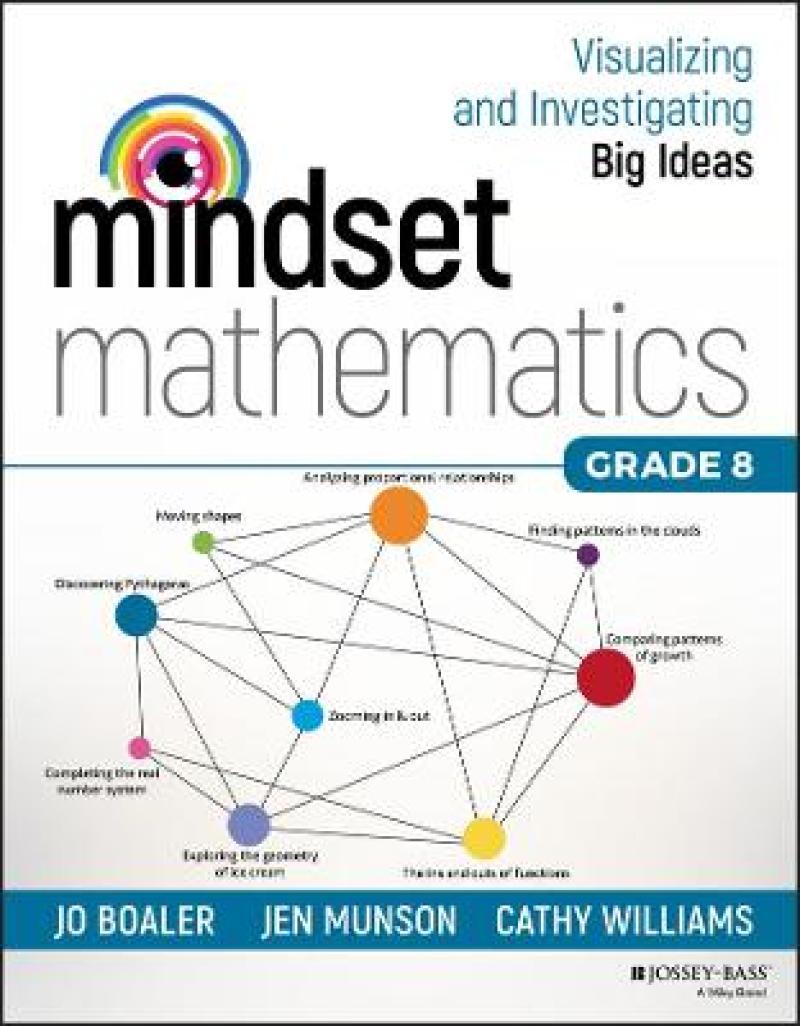The most challenging parts of teaching mathematics are engaging students and helping them understand the connections between mathematics concepts. In this volume, you'll find a collection of low floor, high ceiling tasks that will help you do just that, by looking at the big ideas at the eighth-grade level through visualization, play, and investigation.
During their work with tens of thousands of teachers, authors Jo Boaler, Jen Munson, and Cathy Williams heard the same message—that they want to incorporate more brain science into their math instruction, but they need guidance in the techniques that work best to get across the concepts they needed to teach. So the authors designed Mindset Mathematics around the principle of active student engagement, with tasks that reflect the latest brain science on learning. Open, creative, and visual math tasks have been shown to improve student test scores, and more importantly change their relationship with mathematics and start believing in their own potential. The tasks in Mindset Mathematics reflect the lessons from brain science that:
- There is no such thing as a math person - anyone can learn mathematics to high levels.
- Mistakes, struggle and challenge are the most important times for brain growth.
- Speed is unimportant in mathematics.
- Mathematics is a visual and beautiful subject, and our brains want to think visually about mathematics.
With engaging questions, open-ended tasks, and four-color visuals that will help kids get excited about mathematics, Mindset Mathematics is organized around nine big ideas which emphasize the connections within the Common Core State Standards (CCSS) and can be used with any current curriculum.
Introduction 1
Low-Floor, High-Ceiling Tasks 2
Youcubed Summer Camp 3
Memorization versus Conceptual Engagement 4
Mathematical Thinking, Reasoning, and Convincing 5
Big Ideas 9
Structure of the Book 9
Note on Materials 17
Manipulatives and Materials Used in This Book 18
Activities for Building Norms 21
Encouraging Good Group Work 21
Paper Folding: Learning to Reason, Convince, and Be a Skeptic 22
Big Idea 1: Moving Shapes 27
Visualize: What Does It Mean to Be the Same? 29
Play: Pixel Puzzles 35
Investigate: Slide It, Flip It, Turn It 45
Big Idea 2: Zooming In and Out 53
Visualize: What is Similarity? 55
Play: Find the Fakes 60
Investigate: Growing on a Grid 65
Big Idea 3: Analyzing Proportional Relationships 71
Visualize: Dropping the Altitude 73
Play: Seeing Triangles under the Line 79
Investigate: Stairway to Eleven 85
Big Idea 4: Comparing Patterns of Growth 91
Visualize: Squared Squares 93
Play: Skip-Counting Arrays 100
Investigate: Stacking Pennies 107
Big Idea 5: The Ins and Outs of Functions 117
Visualize: Growing Functions 120
Play: Getting Warmer! 134
Investigate: The Functions of Near Squares 140
Big Idea 6: Finding Patterns in the Clouds 149
Visualize: What’s Going On in This Graph? 151
Play: What’s the Story Here? 158
Investigate: Creating Data Visualizations 166
Big Idea 7: Completing the Real Number System 177
Visualize: Square Sides 179
Play: Between 4 × 4 and 5 × 5 187
Investigate: The Hypotenuse Hypothesis 193
Big Idea 8: Discovering Pythagoras 201
Visualize: Unpacking Pythagoras 204
Play: Pythagorean Triples 209
Investigate: Approximating Square Roots 214
Big Idea 9: Exploring the Geometry of Ice Cream 221
Visualize: Building Intuition about Volume 223
Play: Comparing Cylinders 227
Investigate: Scooping Up Volume 233
Appendix 239
Centimeter Grid Paper 240
Grid Paper 241
Isometric Dot Paper 242
Dot Paper 243
About the Authors 245
Acknowledgments 247
Index 249
Engage Your Students in Visual, Creative Explorations of the Big Ideas in Mathematics
The Mindset Mathematics series offers a unique, research-based visual approach to exploring the big ideas in mathematics, which is essential to future mathematics success. This hands-on resource is for any teacher who wants to engage their eighth grade students in reasoning and persisting through problems, and provides activities that will engage students' interest and show them the many ways that mathematics is important in their lives.
During their work with tens of thousands of teachers, authors Jo Boaler, Jen Munson, and Cathy Williams heard the same message: Teachers want to incorporate more brain science into their mathematics instruction, but they need guidance in the techniques that work best to promote learning of mathematics concepts. In this much-needed volume, the authors clearly show what the big ideas are at this grade level, why they are important to know, and how students can best learn those big ideas.
Filled with engaging questions, open-ended tasks, and four-color visuals, Mindset Mathematics is designed to be flexible so that it can be used with any current curriculum. All of the activities and tasks include instructions for launching in the classroom, suggestions for facilitating dynamic discussions, and guidance for what to look for in student thinking as it develops.
Produktdetaljer
Biografisk notat
JO BOALER is a professor of mathematics education at Stanford University and co-founder and faculty director of youcubed. She serves as an advisor to several Silicon Valley companies and is a White House presenter on girls and STEM (Science, Technology, Engineering, and Math). The author of seven books, including Mathematical Mindsets, and numerous research articles, she is a regular contributor to news and radio in the United States and England.
JEN MUNSON is an assistant professor of learning sciences at Northwestern University, a professional developer, and a former classroom teacher. She received her PhD in teacher education and mathematics education from Stanford University. Her research focuses on responsive, equitable mathematics instruction and coaching.
CATHY WILLIAMS is the co-founder and the executive director of youcubed at Stanford University. Before working at youcubed, she was a high school math teacher and worked in mathematics curriculum and administration at the county and district levels in California.
